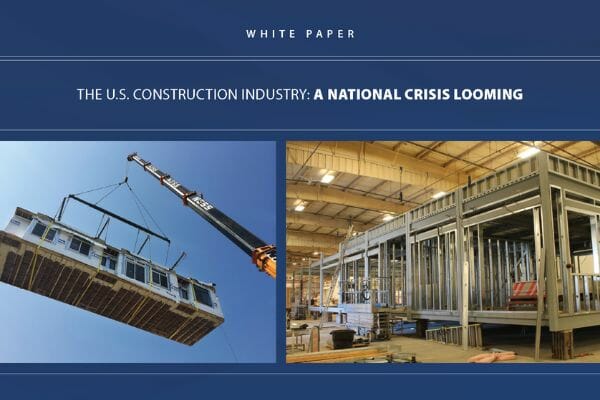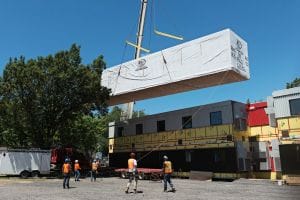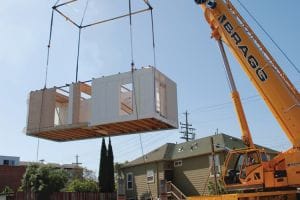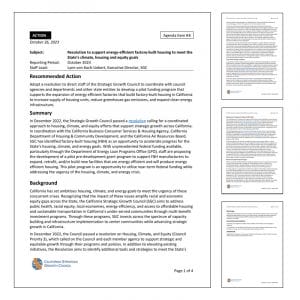Urban Areas Paving the Way for Modular Construction to Address Housing Needs
Exciting news for the modular construction industry from Chicago and Salt Lake City
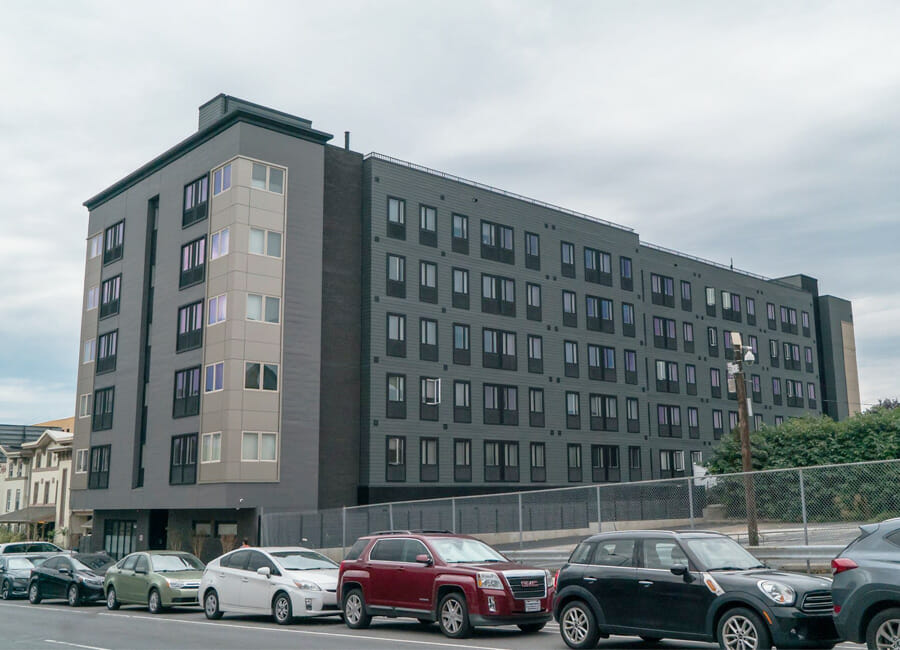
There’s a shortage of affordable housing across the United States. The National Low Income Housing Coalition reports that “Only 37 affordable and available rental homes exist for every 100 extremely low-income renter households” across the country. Furthermore, the organization found that no state or major metropolitan area has an adequate supply of rental housing for its lowest income renters.
The lack of skilled labor to build new homes is exacerbating the shortage. According to Associated General Contractors (AGC), 80% of contractors were finding it difficult to hire enough skilled workers in 2019. And the pandemic appears to have made the problem even worse.
Without enough skilled labor, homes are more expensive to build and they can’t get built quickly enough — ultimately pushing up rental costs.
There is good news, though. Two cities — Chicago and Salt Lake City — are removing obstacles so modular construction can do more to help address their housing shortages.
Chicago
“The city of Chicago has a shortage of about 120,000 units of affordable housing,” says Grant Ullrich, the Managing Deputy Commissioner of Chicago’s Department of Buildings.
The lack of skilled labor contributes to the problem. “The skilled labor force is aging and there are fewer young people interested in construction as a career path,” Ullrich says.
To help address these housing needs, the city’s Department of Buildings and Department of Housing initiated Bill SB 1839, which is sponsored by Illinois State Senator, Mattie Hunter. The bill is currently making its way through the state approval process. No opposition is anticipated.
The goal is to remove unnecessary restrictions on modular construction across Illinois. Currently, the Illinois Department of Public Health has regulatory authority over modular construction statewide, which applies in addition to local building codes. For example, the state regulations include a high wind load standard, “which perhaps stems from when they were focused on the regulation of trailer homes that don’t have permanent foundations,” Ullrich says.
A recent project in Chicago involved three-unit apartment buildings, which met all the city’s structural standards. “But when the state-level standard was applied, it added between $5,000 and $10,000 to the cost per unit,” Ullrich says. These unnecessary costs mean that modular construction cannot fully realize its potential to help address the housing shortage.
Related Reading:
The U.S. Construction Industry: A National Crisis Looming
Even before COVID hit, there were not enough skilled workers to build all the projects that needed to be built. And the problem is only getting worse. The need for construction in the U.S. is high while the supply of labor is flat and declining relative to demand. This white paper from the Modular Building Institute explores the issue.
Why Modular?
“There are many pieces necessary to solve the puzzle of affordable housing, including zoning, regulations, land use, government support, and so on,” Ullrich says. “Modular is one tool that both the Department of Housing and the Department of Buildings identified as helping to meet the need for affordable housing.”
One of the ways modular construction helps is by mitigating the labor shortage. “Working in a climate-controlled factory is generally more attractive than working out in the elements,” Ullrich says. “Modular also has the potential for cost and quality control advantages. There are also time-to-construction advantages — especially in a city like Chicago that has some seasons better than others for outdoor construction work.”
MBI has issued a memorandum of support for the bill. “This legislation means that no entity in Illinois — including a city or a municipality — can adopt guidelines for modular construction that are more stringent than those for conventional, site-built structures,” says Jon Hannah-Spacagna, MBI’s Government Affairs Director.
If the bill passes, modular construction in Illinois will be regulated by the International Residential Code for One- and Two-Family Dwellings and the International Building Code, just as conventional construction is.
“This legislation will level the playing field for modular construction in Illinois,” Hannah-Spacagna says.
“There are many pieces necessary to solve the puzzle of affordable housing, including zoning, regulations, land use, government support, and so on. Modular is one tool that both the Department of Housing and the Department of Buildings identified as helping to meet the need for affordable housing.”
Grant Ullrich, the Managing Deputy Commissioner of Chicago’s Department of Buildings.
Salt Lake City
There’s a shortage of affordable housing in Salt Lake City too. “Thousands of new apartments have been built here, but they’re not affordable,” says Orion Goff, Deputy Director of the city’s Department of Community and Neighborhoods. “Apartment rental rates may start from $1400 a month, so lots of people are priced out of the market.”
In Salt Lake City, restrictions on building inspections were the hurdle preventing modular construction being more able to help solve this housing problem. “The ordinance that’s currently active in Salt Lake City requires building officials to do all new construction inspections within the city — which is a problem for modular buildings, which are built off-site, outside the city,” explains Goff.
To solve this problem, the city needed to set up a modular program that allows third party, independent inspection agencies to conduct inspections of factories and modules outside city limits.
That’s where the new ICC/MBI standards come into play. The Modular Building Institute worked with the International Code Council to create an ANSI standard for starting a modular program. Once the standard has been officially published, it’ll be a standardized outline for how a state or jurisdiction can set up and run a modular program. It lays out the minimum requirements for off-site and modular construction and addresses issues around local inspection and regulatory compliance.
Salt Lake City Council recently voted unanimously to adopt this ANSI standard. “The new ordinance allows modular units to be brought from out of state if they’re manufactured in a plant that’s been certified by the International Code Council (or similar) and if they’re built to the standards already adopted by the state of Utah for electrical, plumbing, mechanical, fire, etc.” says Goff.
“We’re hoping that because this Standard has been adopted by Salt Lake City, the state of Utah will also adopt it — because there’s currently not a modular program at the state level,” Hannah-Spacagna says.
MBI also plans to present the Standard to other states that don’t currently have a modular program, and explain how it can benefit them.
“We’ve shared the ANSI standard that Salt Lake City adopted with Chicago officials working with Senator Mattie Hunter’s office,” Hannah-Spacagna says. “We hope it will help Illinois adopt a statewide modular program.”
About the Author: Zena Ryder is a freelance writer, specializing in writing about construction and for construction companies. You can find her at Zena, Freelance Writer or on LinkedIn.
Additional Government Affairs Articles
A Huge Win for the Modular Construction Industry in Massachusetts
In early February, 2024, the Massachusetts Board of Building Regulations and Standards (BBRS) released its proposed 10th Edition building codes. This draft included several amendments targeting modular construction that would have created an extremely difficult environment for the entire modular industry and could have eliminated the industry entirely in the state.
Read Complete ArticleFEMA Announces Hawaii Housing Plan Using Modular Construction
Utah becomes the second state in the country, following Virginia, to fully adopt ICC/MBI standards 1200 and 1205. MBI will continue to work with leadership in Utah to implement the new program.
Read Complete ArticleICC/MBI Standards 1200 & 1205 Provide Foundation for Utah’s First-Ever State Modular Program
Utah becomes the second state in the country, following Virginia, to fully adopt ICC/MBI standards 1200 and 1205. MBI will continue to work with leadership in Utah to implement the new program.
Read Complete ArticleBuilding at the Intersection of Housing Affordability & Energy Conversation
Tasked with looking at how the state of California can best house its growing population while meeting its aggressive energy, housing, transportation, land use, and equity goals, the California Strategic Growth Council (SGC) faces a slew of challenges. But, if the outlook of SGC Executive Director Lynn von Koch-Liebert is any indication, it’s only a matter of time before those challenges are successfully met.
Read Complete Article
